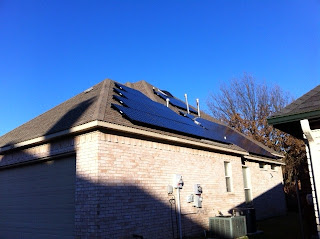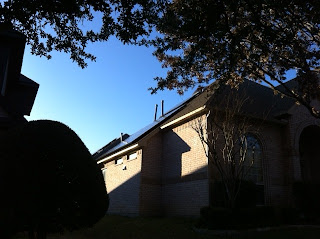 |
| View of our solar panels from the alley |
I'm really excited about the benefits (primarily to save money), but our setup was only made possible, financially, due to:
1) Federal tax credit of 30% with no cap
2) Local utility rebate of $2 per Watt up to $20,000
3) Solar lease option (such as with SolarCity)
Photovoltaic (PV) systems are so much more affordable than they were not even 5 years ago, due to the federal tax credit (which has been extended through 2016) combined with other available rebates, like my incentive from Oncor. Additionally, component costs have been dropping quickly the last few years as well, further improving bottom-line cost of a residential PV system (although potentially making rebate/incentive programs unnecessary).
Regarding the third item from the list above, there were two options when deciding how to fund (out of our pockets) the solar equipment and installation: Buy it or lease it.
Just like buying a car, purchasing the PV system means that we pay the entire upfront cost of equipment and installation, plus all ongoing maintenance and insurance for the life of the system. However, we get to enjoy use of the system for its operational lifespan (at least 30 years) and include it in the price of the home, if we sell sooner.
On the other hand, leasing a PV system simply requires that we pay for the use of the equipment for a predefined number of years. Since the lease company owns the equipment, ongoing maintenance and insurance is handled by them as well. In our setup, our lease is for 15 years, so we will not enjoy its use through its full operational lifespan. The primary benefit is the lower upfront cost of the system.
 |
| View of our solar panels from the street |
Compared to the PV system that we actually leased, at 6.4 kW, our full prepaid cost was about $5k. The lease company can offer this lower cost because they receive the federal and local rebates, instead of us. Also, my guess is that they factor in the potential value of the equipment at lease-end.
So, what's the payback to break even (and enjoy free electricity)?
Both systems are estimated to generate around 8,600 kWh per year, which an average of a little more than 700 kWh per month. Electricity prices fluctuate greatly from year-to-year and the actual savings is a bit more complicated than most PV-pushers (go figure) will tell you, but using a buy-back (I'll explain this in a future post) rate of about $0.075 per kWh, that's a savings of about $50 per month.
Now, taking the upfront costs and the monthly savings together, we get...
Purchase: $19k/$50 per month = 380 months (31 years)
Lease: $5k/$50 per month = 100 months (8 years)
It's now fairly obvious that the lease option was much more attractive than buying the system outright. We can enjoy free electricity generated from our solar panels in years 8 through 15.
Despite federal and local rebates, which cut the total cost by more than half, purchasing a PV system is still not a financially viable option, which I presume is the case for most homes, assuming your local utility rebate terms are similar.
I'll post more goodies about how we went about shopping for an electricity rate, considering our newly installed solar panels. You may be surprised to know that most electric retailers don't pay (also known as buy-back or net metering) for excess energy put back onto the grid. Details coming soon.
What Solar company did you go with?
ReplyDeleteWe went with SolarCity and everything is working out great so far... You can check out our current and historical solar energy production here:
DeleteMy Solar System